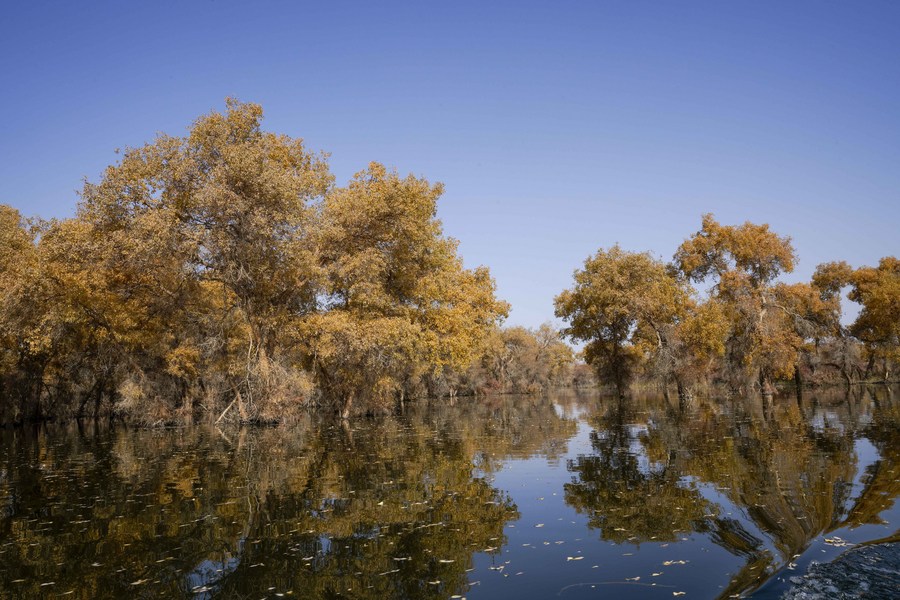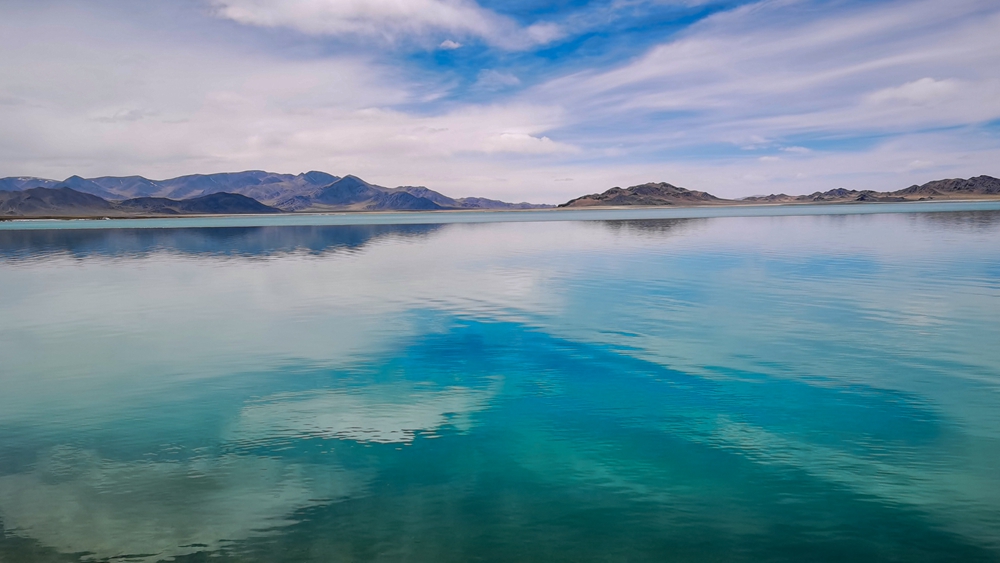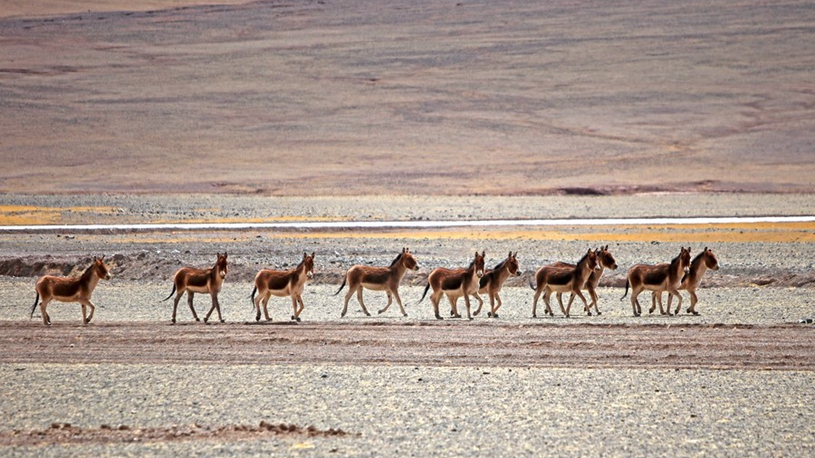
Photo taken on Oct. 27, 2021 shows poplar trees at Lop Nur National Wetland Park in Yuli County, Bayingolin Mongolian Autonomous Prefecture, northwest China's Xinjiang Uygur Autonomous Region. (Xinhua/Zhao Ge)
URUMQI, April 22 (Xinhua) -- Imagine a stretch of forest by a river, with a dense covering of leaves, the sound of trickling water and wild birds fluttering around -- in a desert.
Such a scene may seem unreal, but it certainly exists. For it describes a flourishing poplar forest along the banks of the Tarim River in northwest China's Xinjiang Uygur Autonomous Region, on the northern edge of the Taklimakan Desert.
These days, it is thriving, a haven for wildlife amidst a rugged desert environment. However, until around 20 years ago, this landscape was more closely associated with death than life.
FOREST LIFELINES
Populus euphratica (more commonly known as "desert poplar") is a rugged species of tree, dubbed "guardian of the desert." It is resistant to low temperatures, drought and saline-alkali soil, and serves as an ideal windbreak and sand-fixation plant.
The 17-million-mu (about 1.13 million hectares) populus euphratica forest, the largest natural forest of the species, has been nurtured by the Tarim River, China's longest inland river, for centuries.
However, starting in the 1950s, ecological conditions deteriorated due to the overexploitation of water resources along the Tarim River, causing the river to dry up as water levels dropped. Swathes of populus euphratica trees died as a result.
In the hope of saving the forest, in 2001, Xinjiang started to channel water from upstream sections of the Tarim River to the forest in its lower reaches during the high-water season.
In 2019, a restoration project was initiated to enhance the forest's capacity for self-repair through building flood diversion facilities to irrigate the degraded populus euphratica trees. With an investment of 124 million yuan (about 19.3 million U.S. dollars), the project detailed ways to make full use of the channeled water.
Among the key figures in this work is Ilham Burhan, head of a ranger station in Yuli County. Digging ditches has become a normal part of daily life for him, working alongside his fellow rangers.
According to Ilham Burhan, these ditches are used to connect the separate water bodies, thus expanding the volume for water reservoirs and sending more water into the inner parts of the forest.
He has also built a diversion canal that stretches over 10 kilometers from the Tarim River, allowing water to flow along its ancient course, which had dried up for ages.
The joint efforts of the rangers and local government have borne fruit. To date, over 6.8 million mu of poplar forest has been saved from degradation, according to the regional forestry and grassland authorities.
Over the past three years, the average height of populus euphratica trees in areas with irrigation channels increased by 0.4 to 0.7 meters, with the number of seedlings increasing by some 14.3 million, official data shows.
NO-MAN'S-LAND
Forest rangers have been protecting the ecological environment along the river for more than two decades now.
The ranger station where Wali Osman works is located in no-man's-land over 220 kilometers from the Yuli county seat, and less than 200 kilometers west to the Lop Nur, where ruins of the lost civilization of Loulan were discovered.
The four rangers in the station take shifts patrolling an area of approximately 10 million mu. They conduct patrols on motorcycle every day, with the farthest patch of forest located 180 kilometers away.
Wali Osman became a ranger 20 years ago. Having witnessed the gloomiest days of the forest, when it was hard to find a shady place in summer, his greatest wish is to "see these trees grow better." Despite being the oldest ranger on his station, he has voluntarily shouldered more work.
He only takes a few days off once a year. During each short vacation, he rides his motorcycle to his home in the county, where he visits his grandchildren, returning to the station the following day with a full load of necessities.
Though he has passed the age of retirement, Wali Osman has no intention of ending his career. "I want to go on with the job as long as my health allows," he said, adding that he wants to be buried in the forest.
FOR A BETTER HOMELAND
In the past, the work of forest rangers was not limited to battling drought, sandstorms and pests; they also found potential rivals among the local residents.
Ali Niyaz, who used to be a ranger, recalled the days when he grappled with those who destroyed the forest for firewood, plowland and other purposes.
However, the locals have become better off in recent years and their awareness of ecological protection has also improved, said Ali Niyaz. "Now, phenomena such as deforestation for plowland and excessive felling can no longer be seen," he said.
Over the years, more and more people in Yuli have joined the drive to protect the populus euphratica forest. The number of rangers has grown from 15 in five stations to the present 190 rangers in 22 stations.
Xinjiang's efforts to save its populus euphratica forest have not gone unrewarded. The restoration of the forest has prevented the Taklimakan and Kumtag deserts from merging, and tourism has grown due to the improvement of the ecological environment.
As more visitors came to appreciate the spectacular forest scenery, Rozitan Sidiq decided to return to his home in Yuli after graduating from college. Now, he owns a homestay close to a scenic spot. In February alone, the business earned him 80,000 yuan.
The 27-year-old is proud to see the transformation of his hometown.
"I once received a 'complaint' from one of my customers," he said. "The visitor used to photograph the trees right in front of them, but can no longer do so, because the forest is 'flooded' now!" ■












